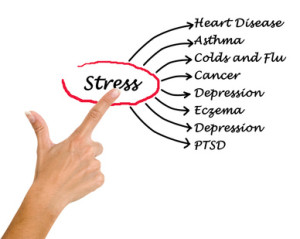 Stress is defined as a specific response by the body to a stimulus, such as fear or pain, which disturbs or interferes with the normal physiological equilibrium of an organism. Stress can arise from both real and imagined situations. Stress is subjective; what is a stressor to one person, may not be to another. Stressors are not limited to negative situations, but can come in the form of traditional happy experiences such as weddings, a new baby, moving to a new house etc. Stress can come in the form of a chemical exposure, allergy or underlying infection, as these events alter physiologic function. If there is a difference between what we had expected/hoped for, and what is actually happening, we register STRESS.
Stress is defined as a specific response by the body to a stimulus, such as fear or pain, which disturbs or interferes with the normal physiological equilibrium of an organism. Stress can arise from both real and imagined situations. Stress is subjective; what is a stressor to one person, may not be to another. Stressors are not limited to negative situations, but can come in the form of traditional happy experiences such as weddings, a new baby, moving to a new house etc. Stress can come in the form of a chemical exposure, allergy or underlying infection, as these events alter physiologic function. If there is a difference between what we had expected/hoped for, and what is actually happening, we register STRESS.
Our bodies were designed with the capacity to sense and respond quickly to danger or a threat of some kind. Our adrenal glands pump out hormones including cortisol, preparing us to fight or take flight from a threat. After the stressful event is over, our adrenals return to baseline. We have all experienced this – who hasn’t had an adrenaline rush with a near miss in traffic? We all know what the “rush” feels like: heat and power putting us on alert and an increased awareness of everything around us. Modern stress is different and it often doesn’t stop. Instead of a brief encounter with a fight or flight event (as the body intended), our modern day stressors can be more subtle and more constant. Our demanding and pressure-packed lifestyles keep us constantly on alert. We may feel pressure throughout our entire waking day. We’re under the burden of deadlines, bills, demanding schedules, traffic, marital issues, financial difficulties, etc. These perceived stresses can take a real toll on our adrenal health.
At first our adrenal glands respond to this constant stress by maintaining increased cortisol levels. Eventually we lose the ability to sustain these levels, and our cortisol levels drop. Adrenal fatigue often starts when “burning the candle at both ends” catches up with us. Often this is after long periods of stress or after an extremely stressful event, overworking for extended periods without play or relaxation, or after an extended illness. At this point, we begin to experience the symptoms of adrenal fatigue: burnout, exhaustion, erratic and intense perimenopausal or menopausal symptoms, increased PMS, decreased pain tolerance, over-reaction to minor stressors, and extreme cravings for sugar and salt.
What can make adrenal fatigue worse? Poor dietary habits, continuous stressors without perceived relief, unhappy relationships at work or at home, lack of exercise, lack of fun, no control over how you spend your time, or feelings of powerlessness.
What can make adrenal fatigue better? Having a proactive mindset, adequate sleep, calm environments, eating regularly to avoid low blood sugar, laughing often, yoga, rest and relaxation, deep breathing, and saying no to requests from friends or colleagues when you have no time to fulfill them.
Adrenal dysfunction can have a direct effect on the rest of the endocrine system. In order to address adrenal fatigue most fully, we test your diurnal cortisol levels along with estradiol, progesterone, testosterone and DHEA. Evaluating and balancing hormones is the foundation upon which good health can be built. Our treatments, including acupuncture, tui na and lifestyle can help restore these levels.

